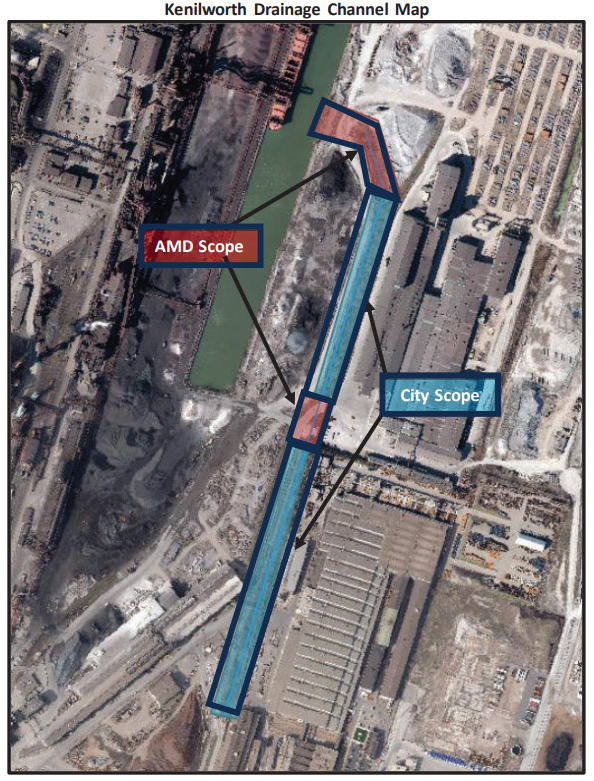The Court of Appeal for Ontario has upheld a scathing Superior Court decision finding the City of Hamilton liable for repeated sewage-laced flooding on National Steel Car Limited’s property north of Kenilworth Avenue.
The City’s failure to maintain the 1,014.98-metre combined-sewage overflow channel north of Kenilworth Avenue for 23 years resulted in 15 distinct floods on National’s property between September 2010 and October 2021.
In July 2024, Ontario Superior Court Justice Michael R. Gibson found both the City and co-defendant ArcelorMittal Dofasco (AMD) jointly liable for the flooding. He ordered combined compensatory damages of $5,287,325.28, plus $936,000 in prejudgment interest, and an additional $900,000 in punitive damages ($400,000 against the City, $500,000 against AMD).
The City and AMD are each responsible for 50 per cent of compensatory damages and interest. Additionally, they are responsible for National’s legal costs.
Justice Gibson issued a permanent injunction requiring the City to clear the drainage channel, dredge it to its natural depth, and maintain it in perpetuity.
In his 298-paragraph decision, Justice Gibson found the City engaged in a “deliberate strategy to not acknowledge its ownership of a portion of the Channel,” conduct characterized by “reckless indifference” to its duty.
Key to the findings was that the City conducted its own mapping and surveying department research in October 2000 that confirmed its ownership of the channel. Despite this definitive internal knowledge, the City continued to deny ownership until four days before trial began in March 2023—a 23-year campaign of deliberate misrepresentation.
At appeal, the City raised three arguments: that the damages were excessive, that it should not be held responsible for knowledge held by its employees, and that the mandatory injunction should be amended to shield the City from liability if a “freak storm” overwhelmed the channel’s capacity.
The Court of Appeal rejected the City’s first two arguments entirely.
On the institutional knowledge question, the City argued that internal memos from its mapping and survey department did not constitute “actual knowledge” because municipal staff are not “directing minds” of the corporation. The appellate court dismissed this reasoning, finding the City’s conduct so egregious it amounted to being “at worst… wilfully blind” to facts it had deliberately concealed.
The City also argued that National should have implemented greater mitigation measures to manage overflow sewage spilling onto its property. The appellate court rejected this claim, finding the flooding resulted clearly from the City’s and AMD’s negligence.
The City succeeded only on the motion to amend the injunction language. The Court of Appeal clarified that the City is not automatically liable if a “freak storm” overwhelms the channel’s capacity, provided the City maintains its obligations. National did not oppose this amendment.
AMD did not join the City’s appeal, and maintained neutrality during the appeal proceedings. The Court of Appeal has ordered the City to pay $30,000 to National and $30,000 to AMD on a partial indemnity basis for appeal legal costs.
The scope of this litigation was substantial. The Superior Court case involved 23 days of oral arguments and years of preparation before trial. The City then retained a more expensive law firm to pursue the appeal. The scale of legal expenditure remains undisclosed, as City Council does not publicly reveal its legal spending.
The City of Hamilton is now required to dredge and repair the channel. City Council has budgeted $5-million. Had the City conducted the work in 2001, when National first demanded action, the cost would have been $600,000.
City Solicitor Lisa Shields stated that Hamilton City Council will be briefed on the decision in the near future.
Production Details
v. 1.0.0
Published: November 17, 2025
Last updated: November 17, 2025
Author: Joey Coleman
Update Record
v. 1.0.0 original version


This is hardly a surprise. The City has incorrect engineering drawings for infrastructure across the City of Hamilton. We all know that infrastructure is not maintained.
It’s time the City of Hamilton ditch the combined sanity/ storm systems. Upgrade the whole city. Like Kitchener Waterloo was ordered by the feds in the 80s.
Perhaps the City needs a whistle blower program in their sewage and infrastructure departments. This has gone on too many times and for far too long where the City know they are wrong and choose to ignore and/or be willfully blind. Whose head will roll for this enormous tax payer expense. I am betting no one’s. I would also wager that if this had been the fault of the worker bees instead of the management team there would have been mass dismissals. Very sad.